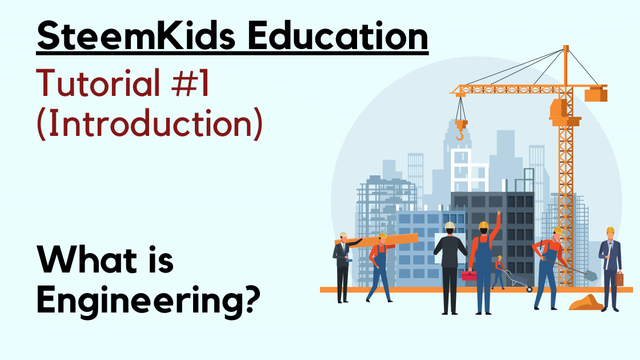What is Engineering? - Steemkidss Engineering Course Introduction, Season 1: Tutorial 1 by @cryptogecko

Namaste Steem Family,
My name is Ravi Gohel, I am from India and I am your new teacher. I am going to post tutorials on the subject of engineering and this is the first tutorial in this series. This is an introduction of the engineering domain. I hope that you like it. So, let us start.
The world around us is filled with a great variety of creations. There are probably many things that we see around us that were created by someone else. In the same way, the technology which is being used to write this blog post, as well as to read it, has also been created.
It was not a single genius, but rather expert teams of people - sometimes generations of people - who were responsible for the developments. Among them, several engineers were also responsible for the development. After all, the job of an engineer is to be creative.
It is interesting to note that the word "engineering" is derived from the Latin word ingenium, meaning "cleverness", and ingeniare, meaning "to design or devise". Having said that, it is also a reasonable observation given that the ability of engineers to solve problems they face daily is dependent upon how clever they are.
As a subject, engineering is often considered a branch of science - and it wouldn't be wrong to classify it as such. But perhaps the best way to view science is as a tool, a tool that engineers - in conjunction with mathematics - require to accomplish their unique tasks.
As you continue through this post, you will have the opportunity to see how much can be accomplished through engineering. Math is indeed at the core of engineering, but it is the ideas and applications that have more significance in engineering than mathematics itself. We can learn a lot from these ideas and applications, as they can help us to understand how engineering can be applied to solve problems.
The discussions will include an overview of what has already been accomplished, an investigation of what breakthroughs are being made currently, and a reflection on what we hope to accomplish. Furthermore, we will demonstrate how these ideas can be put to use to engineer something special.
We aim to help you become inspired by engineering and captivated by its underlying principles. That is exactly what this tutorial series aims to accomplish.
Picture yourself in your mind taking a walk, perhaps on your way to class or the gym, or maybe you're going to a meeting at your workplace. While walking along the pavement, you come across a blob...and you cannot help but look at it. You wonder what it is. The blob appears pink, quite large, and wiggles. Surely this isn't something that you would expect to find in the real world, right? Would you happen to know what you should do in this situation?

Since you are a highly curious individual with some experience in scientific investigation, you wish to apply science to investigate the blob. Perhaps you have studied chemistry in the past. You might want to analyze its molecular structure or what chemical components it contains to gain more insight into what the blob is made of. Perhaps you have noticed that the blob is moving, or that it is making noises, and you are wondering if it is a living creature.
As a result, you may wish to test whether or not it responds to water or the point of your pen in this given situation. It is possible that you might be interested in obtaining a sample of it, to learn more about its chemical composition. This substance might have some unusual properties, which would presumably lead you to want to learn more about it. Several approaches could be used to approach the situation scientifically. You are especially interested in learning more about it and you are eager to discover more.
In essence, that is what science is all about.
From our expanding knowledge of the universe to the very smallest particles found on the tip of your pencil, the pursuit of scientific knowledge has brought many questions regarding the nature of the universe. Engineers, however, are not just interested in answering questions. They are also interested in finding solutions. The true essence of engineering is the process of finding solutions to problems by making clever solutions to existing problems. You're in luck because there is good news for you. You already CAN think like an engineer.
The chances are high that you have dabbled in engineering at some point if you have ever wondered what you could do with something. Your engineer's mind would have come in handy any time you were building a snowman after determining the packing property of the snow. Even though I do not think you should include that in your resume, I still give you a thumbs-up for the effort.

Considering this, it would be interesting to see your engineering response to the mysterious sidewalk blob from a different viewpoint than the one it occupies now. I believe you will answer the question according to the nature of your engineering concern.
Modern engineers possess a much broader range of responsibilities and competencies than they used to possess in the past. There are several reasons for this, including the fact that engineering originally was used exclusively for military purposes.
Engineers who specialized in military technologies designed and built military equipment as well as coordinated communications and transportation. Trebuchets, catapults, and siege towers are examples of ancient siege weapons. War machines and military structures of this type were used by the Babylonians and Assyrians in the 11th century BCE. You would need a skilled engineer if you were planning on storming a castle.
From the perspective of a military engineer in this situation, the primary concern would be how to destroy the blob. In addition, you would also need to protect yourself from it.
It was after the development of military engineering that civil engineering became the first modern engineering discipline. The origins of civil engineering date back to the 18th century. As the name suggests, civil engineering is carried out for civil purposes rather than military purposes. As a civil engineering major, you will be focusing primarily on the design, construction, and maintenance of all kinds of structures, from highways to sanitation systems to entire cities.
In case you are interested in this area of engineering, you might want to examine the blob in order to find out if it has any properties that could be utilized to solve problems that are encountered by ordinary people on a daily basis. You might find that, for instance, some of the blob's goo acts as a better insulator than what you currently have at home. Maybe it has unique properties such as being very elastic, and waterproof, or has some other property that makes it useful in urban planning, construction, and infrastructure.
Mechanical engineering began to gain prominence during the 19th century with the industrial revolution and its machinery industry. A major focus of this engineering discipline is machinery and mechanical systems, from engines to robots.
With the invention of electricity and the ability to manufacture electronics, electrical engineering was inevitable. Originally developed in the 19th century, electrical engineering encompasses a wide range of products and systems from microchips to cell phones to power stations that assist in supplying energy to major cities around the world.
Combining mechanical and electrical engineering can produce some pretty amazing inventions. The ideal scenario would be to construct a robot that moves as we do with the aid of a mechanical engineer who can construct the machine's "skeleton." Next, you will need an electrical engineer to wire it up with the appropriate electronics so that it can perform its functions. In addition, if you wish for it to behave like the rest of us, you will need a computer scientist to assist you.
It is important to recognize, however, that engineering is much broader than that. In the late 19th century, another field of engineering emerged. This field is known as chemical engineering. A number of specialized skills have been developed by these engineers over the years. In addition to designing and operating chemical plants, which incorporate products such as refining oil and distilling alcohol, they are also in charge of matters relating to food, medicine, the environment, etc.
It is generally understood that modern engineering is composed of civil, mechanical, electrical, and chemical engineering disciplines. However, there are numerous other disciplines with even more disciplines within them.
The field of aerospace engineering is concerned with the creation of aircraft that can fly through the air and space, while the field of nuclear engineering deals with harnessing the power that nuclear reactions produce, and the field of biomedical engineering is concerned with designing medical equipment and devices that solve various clinical problems.
There is no end to the list as you can see!
The field of industrial engineering, in addition, supports all of these disciplines. It is the responsibility of these engineers to design and optimize the equipment, facilities, and systems that other engineers use to create their products. In some ways, they are considered the support class within the engineering community. They serve as the foundation for many of the technological advances taking place in today's world.
We'll need industrial engineers to assist us with the construction of our factory when we start manufacturing our cool new products with whatever this blob is made of.
In the past few decades alone, we have been able to accomplish some pretty remarkable feats thanks to the power of engineering at our fingertips. Humans have been taken to the moon via spacecraft, and rovers have been sent to Mars' surface, both of which are impressive engineering achievements.
We have developed artificial hearts to pump blood throughout the human body, and we have developed artificial limbs to replace those that have been lost to injury. The towering skyscrapers we have designed reach for the heavens and demonstrate to the world our ability to scale great heights.
The best part is that we are just getting started!
Future advances could provide a way to cure Type 1 Diabetes effectively, such as an artificial pancreas. We are also witnessing the advent of nanotechnology that is proving that you can accomplish a great deal with a little, and we are also on our way to building rockets that will be able to send humans out to Mars so that we can maximize our chances of survival.
Engineering professions can provide all of these benefits and more. Who knows, perhaps one day you may be the person to come up with something truly incredible.

Conclusion
Concerning the blob you found on the pavement, I am unsure of its nature and what it is.
Perhaps it is just a large quantity of chewing gum that people have accumulated over the course of their lifetime. Or perhaps it is something totally different. Whatever the case may be, it is highly likely that you would not be the first or last student to encounter a mysterious object while going about your daily routines.
I have no doubt that there is immense potential in the world to solve problems through strange means. The moment you start applying your engineering mind to everything around you, you will realize that everything around you is both confusing as well as fascinating.
Homework:
Pick one of the engineering field and explain what the engineers of that field work on. And what kind of problems are they solving.
Tell us about an engineering professional who you admire the most and also share with us the field they are working in.
If you become an engineer, what problems would you like to solve first?
Rules:
- You must be a verified kid (adults are also allowed)
- You must at least write 300 words.
- The post must not be plagiarized.
- Use the tags; #learnwithsteem #assignment #steemexclusive #engineering #country #clubstatus in your tags
I hope you liked this tutorial and please tell me in the comments, what you liked in this tutorial.
Hello, thank you for sharing the post on Steem Kids. I enjoyed this post.
Report :
Please review some important guidelines below. If you have any questions, please contact me!
Support Community with delegation & curation trail : https://steemit.com/hive-139765/@steemkidss/join-our-curation-trail-how-or-or-delegate-to-us-or-or-help-us-grow-our-steem-power
How to make quality post on Steem Kids : https://steemit.com/hive-139765/@steemkidss/an-aid-to-making-acceptable-posts-in-steemkids-community-how-to-make-quality-posts
Have a nice day ! thank you,
Thank you so much for taking time to evaluate this tutorial. I respect and appreciate your work brother.
Thanks @cryptogecko for this tutorial. It is down to earth in it's explaination of what engineering is. The illustration of a blob is well understood. The kids will really love this.
I hope so, and I would request the students to read it carefully and take part in the homework task, as this is going to be a really educational series on engineering.
I enjoyed you post! Thank you!
The kids can only benefit from reading and taking part.
Good luck to everybody!
Thank you so much for the words of appreciation, this motivates me to do more for the community. Hope to see good amount of participation from the kids.
Hello @cryptogecko, Your post has been selected as one of the quality posts for the day by steemkids community. Congratulations! Please keep making quality and original contents with us here. We love you so much and will like to read more of your posts.
Please endeavour to resteem, vote and comment on the post of selection. Thank you!
Thank you
Hello @cryptogecko, your post has been supported by @reminiscence01 using @steemcurator09 account.
My homework: https://steemit.com/hive-139765/@ghani12/civil-engineering-an-introduction
In both the civil and defense sector, any lack of knowledge regarding engineering discipline could prove potentially harmful and reduce the efficiency and effectiveness of any organization. Even if it is a private sector firm that operates projects on tenderly basis. After all, advanced technology services are meant to hike up the standard of human community.
@cryptogecko You attempt your best to make kids realize their potential in engineering subjects. The fundamental gaps in their knowledge would surely help them polish their skill through your assignments.
Also, while reading your post, suddenly one thing came to my mind, which @chele2ami would like to say for the purpose to share awareness among your students, the central government of India and the state government of West Bengal provides job vacancy notifications under engineering trade for candidates motivated to apply for sorkari chakrir khobor. There are diverse career options to choose from, as these vacancies range from Grade A to Grade D category.
Although the respective recruitment boards invite online applications, one thing to note is that they follow a strict interview process. But, the truth is that government jobs are highly lucrative in terms of job security, which includes facilities and perks, even though applicants have to go through a competitive examination system.